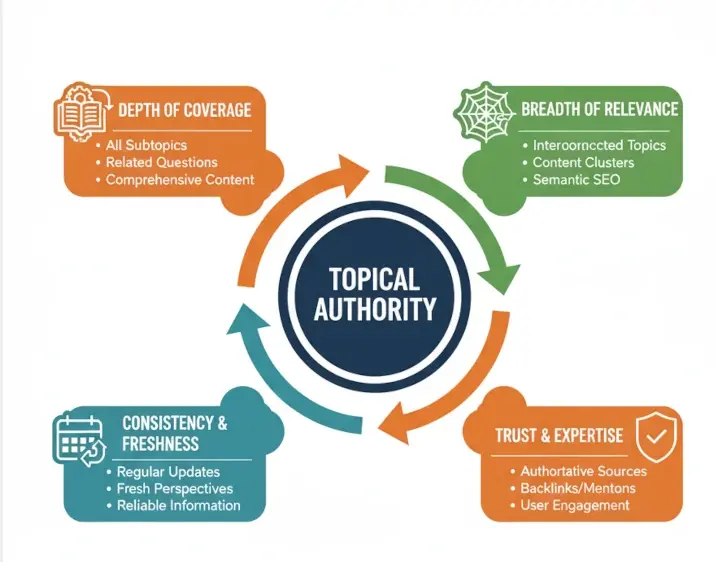If you’ve been posting blogs, optimizing keywords, and still wondering why your site isn’t ranking then my friend, you’re not alone in this.
Here’s the thing — it’s not always about links or word count. Sometimes, it’s about how deep you go into your niche.
That’s where topical authority comes in. It’s Google’s way of saying, “Okay, this site really knows its stuff.”
Once you get it right, even your new posts start ranking faster — like magic (but smarter).
What Is Topical Authority?

Topical authority is basically trust — but earned through content depth, not just backlinks.
Let’s say you run a digital marketing blog. You’ve got posts about SEO, paid ads, social media, content strategy, maybe even analytics. If all that content connects well and genuinely helps people, Google starts to see you as an expert.
That’s topical authority.
It’s not about writing random blogs just to fill the site. It’s about becoming the person or brand people turn to when they think about digital marketing.
If you help clients with SEO daily or run ads that actually perform, your experience already gives you authority. You just have to show it online — through consistent, valuable content.
Why Topical Authority Matters in Digital Marketing
Let’s be real — old-school SEO doesn’t work like it used to. You can’t just stuff a few keywords and expect to rank.
Google’s much smarter now. With all the new AI updates and the Helpful Content and E-E-A-T signals, it’s paying attention to who really knows their niche.
Here’s the simple version:
If your site talks about too many random topics — marketing, lifestyle, health, travel — Google gets confused. It doesn’t know what you’re about.
But if you stay focused — say, you only talk about digital marketing — and break it into clusters like:
- SEO
- Content Strategy
- Paid Advertising
- Social Media
Google starts connecting the dots. It sees your site as a legit authority in that space.
That’s when you notice your content picking up faster, and even older blogs getting a visibility boost.
How Topical Authority Actually Works (Behind the Scenes)
So how does Google figure this out? Let’s simplify it.
- Google crawls your site.
It checks what topics you cover and how those pages relate to each other. - It builds a “topic map.”
When Google sees a bunch of connected articles — all covering different angles of digital marketing — it understands your site has real depth. - It tracks engagement.
The more people stick around, click links, and read your posts, the stronger your authority signal gets.
So basically, Google is trying to see if your site looks like a trusted library or is it just a collection of some random blog posts.
How to Build Topical Authority (Step-by-Step)
Here’s where most people overcomplicate things. You don’t need fancy tools to build authority — just focus on being genuinely helpful in your niche.
1. Choose One Core Niche
Pick one area you want to dominate. Don’t chase every trend.
Maybe it’s:
- SEO for small businesses
- Paid ads for eCommerce
- Content marketing for startups
The tighter your focus, the easier it is for Google (and readers) to remember you for it.
2. Create Content Clusters
This is where things get fun.
Start with one main topic — like SEO Basics — then build smaller posts that cover subtopics:
- Keyword research tools
- On-page optimization
- Link building strategies
- SEO mistakes to avoid
- Measuring performance with Google Analytics
All these smaller posts should link to your main guide — that’s your pillar page.
3. Interlink Like a Pro
I know this one is very underrated.
But internal links are a way of telling Google how your pages connect, and they help readers find more of your content. It’s like giving Google a road map to your expertise.
Each time you post something new, link back to older related blogs. Over time, that internal network becomes a powerful signal of authority.
4. Keep Updating Your Content
As you know marketing changes real fast — what worked six months ago might not now.
So make it a habit to refresh your blogs with updated stats, new tools, or screenshots. Google sees that you’re keeping things fresh, and readers trust you more.
5. Get Real Mentions
When other reputable sites link to your content, it tells Google, “Hey, these people trust this source.”
You can earn that through guest posts, expert quotes, collaborations, or simply creating content good enough that others naturally reference it.
Common Mistakes People Make

Here’s what kills topical authority faster than anything:
- Writing thin, generic content.
- Jumping between unrelated topics.
- Forgetting to link your content internally.
- Ignoring user intent — writing for search engines, not humans.
You don’t need to be perfect. Just stay consistent and go deep instead of wide. That’s how authority compounds.
Final Thoughts
So what we learned is that topical authority isn’t a trick, it is a proof that you know your stuff and that you took time to show it.
And when you stop chasing random keywords and start building content around one main theme your
- rankings
- traffic
- credibility
That all grows naturally.
So it is advised not to rush it and build your content the same way you’d build a reputation offline — by showing up, being useful, and sharing real insights. That’s how you earn Google’s trust and your readers’.
FAQs
Q1. How long does it take to build topical authority?
It usually takes 3 to 6 months depending upon your consistency and niche competition.
Q2. Do backlinks still matter for topical authority?
Yes — but they only help if your on-site content already shows depth and relevance.
Q3. What tools can help measure topical authority?
Try Ahrefs, Semrush Topic Research, or SurferSEO to track your clusters and keyword coverage.
Q4. Can topical authority improve E-E-A-T?
Definitely, when you build deep, high-quality content around your niche, you’re improving both your Expertise and Authority that are the key elements of E-E-A-T.


